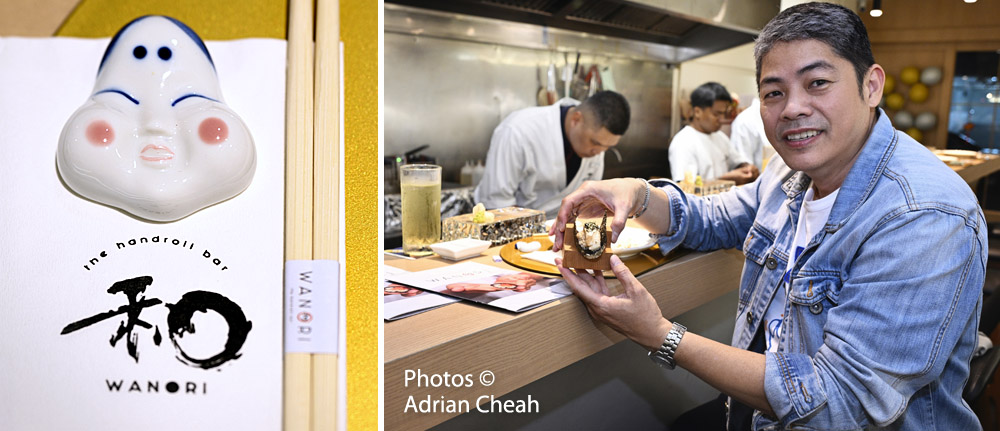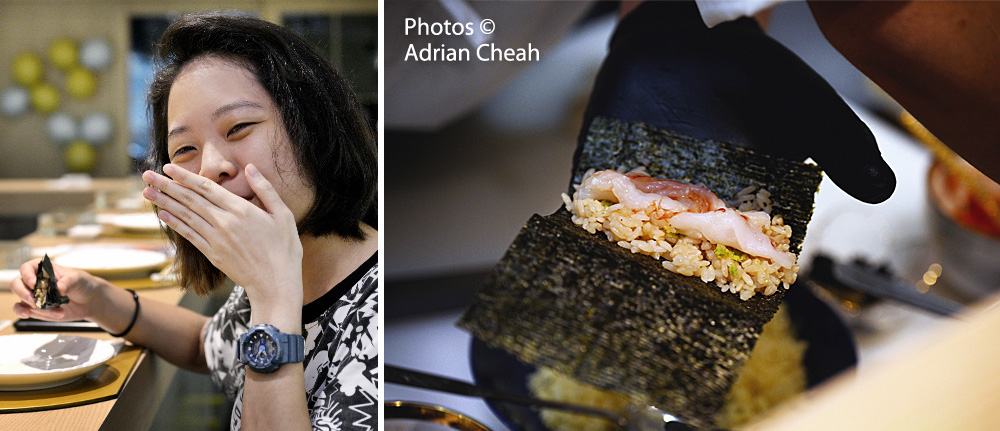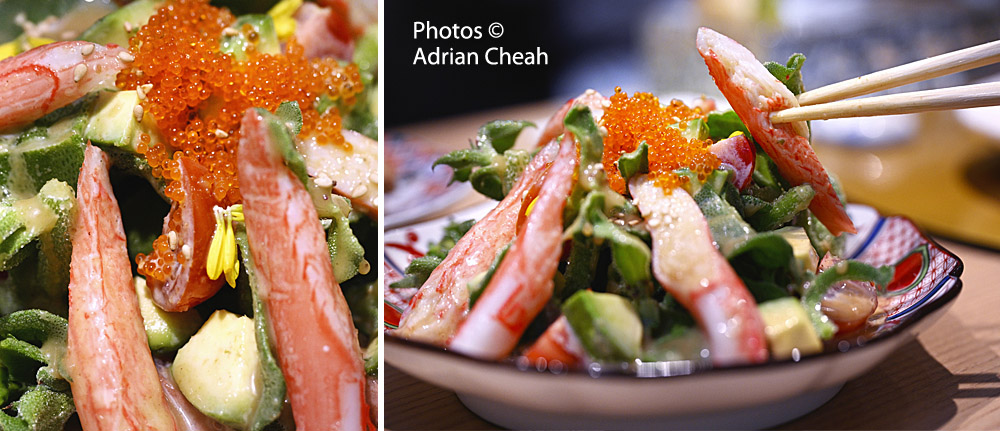Wanori – Penang’s first handroll bar offers a fresh take on Temaki

From the moment we stepped into Wanori – the Handroll Bar, my daughter Jean and I were drawn in by the open-theatre kitchen concept – a front-row invitation to witness culinary artistry in motion. Seated at the bar, we watched as Chef Sitthiporn Kesngern (Chef Mo) and his team prepared our orders, transforming simple ingredients into exquisite bites. Wanori specialised in handrolls but sashimi and signature donburi were also on the menu among others. With its vibrant energy and focus on premium ingredients, it offered a fresh take on casual bar dining and we were simply excited.

I first met Chef Mo long ago at Miraku Restaurant, then again recently at Kaiden Japas before he took up his role at Wanori. A Thai chef with an exceptional grasp of Japanese cuisine, he brings a distinct finesse to every creation. Watching him at work once more, I knew we were in for something extraordinary.

At first glance, handrolls may seem deceptively simple – just fish or seafood over rice wrapped in nori – but in the right hands, they become a study in balance and precision. Every element matters, from the temperature of the rice to the quality of the nori. At Wanori, only Hayashiya Nori, a top-grade variety known for its crisp texture and deep-roasted umami flavour, is used.

After perusing the menu, we began with two appetisers – a crisp, refreshing salad and the golden tori karaage (Japanese-style fried chicken). For the main event, the handrolls were offered in playful sets: "I Could Eat" (four rolls), "Hungry" (five), "Starving" (six) and "Hangry" (seven). True to our appetite, we confidently opted for the "Starving" set.

The first appetiser to arrive was the Kani Ice Plant Salad (RM18+), a delightful mix of crab meat, crisp ice plant, juicy cherry tomatoes and creamy avocado cubes, tossed in a house-made sesame seed dressing. A pop of vibrant orange ebiko topped the dish, adding some briny richness to the salad. Bright and refreshing, the dish offered a vibrant interplay of textures and flavours – creamy, crisp and umami-laden.

Next, a serving of tori karaage (RM18+) arrived piping hot, crisp on the outside and tender within – a popular starter that never fails to please. What sets this Japanese-style fried chicken apart is the use of boneless bite-size thigh pieces marinated in a mixture of soy sauce, mirin, cooking sake and ginger. The pieces are then dusted, traditionally with potato flour, before being fried to a golden crisp. Truly ho chiak!
The "Starving" set (RM88+) comprised six distinct hand rolls, each with a unique ensemble of ingredients. At Wanori, only premium Akita Komachi rice is used – a Japanese variety prized for its natural sweetness and plump texture. When cooked, it turns soft and fluffy, forming the perfect base for handrolls. The rice is then paired with Yokoi’s Red Vinegar, which lends a delicate light-brown hue while deepening its aroma and umami richness. Now, let us take a closer look at each handroll in this set.

The blue crab handroll offered an interesting contrast of textures – crispy tempura crumbs paired with sweet, creamy blue crab meat in mayonnaise. A generous topping of ebiko further accentuated the taste of the sea.
Amusingly, the menu included a note on how to enjoy the handrolls: eat each one immediately – within 20 seconds – leaving no time for photography! A nightmare for those addicted to creating food porn (guilty as charged!). Rightly so, as the moisture from the filling could quickly compromise the nori’s crispness.


The second handroll was the "Salmon Bomb". Why "bomb", you might ask? Most likely for the explosive contrast of textures – soft, melt-in-your-mouth fresh salmon against the satisfying crunch of tempura crumbs. For those who crave a fiery oomph, ask the chef to add some freshly ground wasabi into the rice. That will surely turn up the heat!

The hotate (scallop) handroll was equally delightful with fresh tender scallops lightly brushed with light soy sauce to accentuate their natural sweetness. Hotate are prized for their soft, delicate texture and subtle sweetness, often enjoyed raw in sushi or sashimi. Serving them in this form demands seafood of exceptional quality.

"Most of our ingredients are air-flown from Japan, including seasonal specialities", Chef Mo shared. That evening, he was eager to show me two rare delicacies – almost translucent white strands of baby eels and a palm-sized octopus egg, both of which I had never encountered before. How would they taste? Silky and briny? Rich and unctuous? The mystery lingered, but that discovery would have to wait for another day.


The procession of handroll continued, this time with the filling of aka ebi (prawn). Aka ebi are considered among the sweetest prawns in the world, prized for their superior texture and flavour compared to other varieties. Arguably Japan’s most renowned breed of shrimp, they were lightly brushed with light soy sauce and topped with a generous amount of ebiko.

The Engawa handroll came in a U-shape, served on a wooden holder. Engawa refers to the delicate meat from the muscle that moves the soft rays of a flatfish’s dorsal and ventral fins, typically from species like hirame (olive flounder) or makogarei. Part of what makes engawa special is its rarity. Since it comes from the sinew of the flounder’s fin, only a small amount can be harvested – a 2 kg fish yields just enough for around 14 pieces of nigiri.

For this roll, the flesh was lightly charred with a blowtorch to emphasise its subtle oils. It was then topped with black caviar and finished with a decadent spray of gold dust. The result? A smoky, creamy, sedap-licious indulgence. Easily the standout handroll of the set!

Although Jean and I shared the handrolls – Chef Mo kindly assisted in halving them –we were already quite satiated by the time the final roll arrived. The last handroll was the Tamago Avocado Truffle Cream. The aromatic truffle mayo was a brilliant finishing touch – especially for a truffle lover like me.

We also received a complimentary serving of Ankimo Monaka (monkfish liver) (RM22+ each) presented in a wafer sandwich that is on its seasonal menu. Also known as anglerfish liver, ankimo is a prized delicacy in both Japanese and French cuisine. Considered the "foie gras of the sea", ankimo has long been prized in Japanese cuisine, much like sushi itself, which has evolved over centuries into the refined delicacy we know today.
Sushi’s evolution is a fascinating tale of adaptation. As Eric C. Rath explores in "Oishii: The History of Sushi", it began as narezushi – fermented fish preserved with rice – before evolving into hayazushi, where rice was no longer just a preservation medium but part of the dish. The modern edomae-zushi, featuring fresh fish atop vinegared rice, emerged in 19th-century Edo (now Tokyo), reflecting shifting tastes and the desire for quicker preparation.
The word "sushi" itself means "sour" in Japanese, a nod to its origins in fermentation, which arrived alongside Buddhism in the 9th century. While sushi has taken many forms over the centuries, today’s well-loved varieties include maki (rolled sushi) and temaki (handrolls). The latter, shaped like a cone or cylinder, is meant to be eaten by hand to preserve the crispness of the nori.
Interestingly, one sushi staple, tekkamaki (thin seaweed-wrapped rolls), is said to have originated in Japan’s gambling dens (tekkaba), allowing players to snack without interrupting their game – an origin story not unlike that of the sandwich, attributed to the Earl of Sandwich in 18th-century Britain.

To cap off our memorable meal, we also received a complimentary scoop of house-made black sesame seed ice cream (RM 12+) and sasa custard mochi (RM 10+ each). Each translucent mochi encasing a creamy custard filling was beautifully wrapped in a bamboo leaf.

Wanori is not just a place to dine – it is a front-row seat to culinary artistry. I will certainly return, eager to explore more of its premium selections and uncover new surprises.
-------------------------------------
Written and photographed by Adrian Cheah
© All rights reserved
25 February 2025

Wanori – the Handroll Bar
25-G Lintang Burmah, 10250 Penang
T: +6017–657 0968
Open daily from 4:00 pm – 1:00 am except Mondays